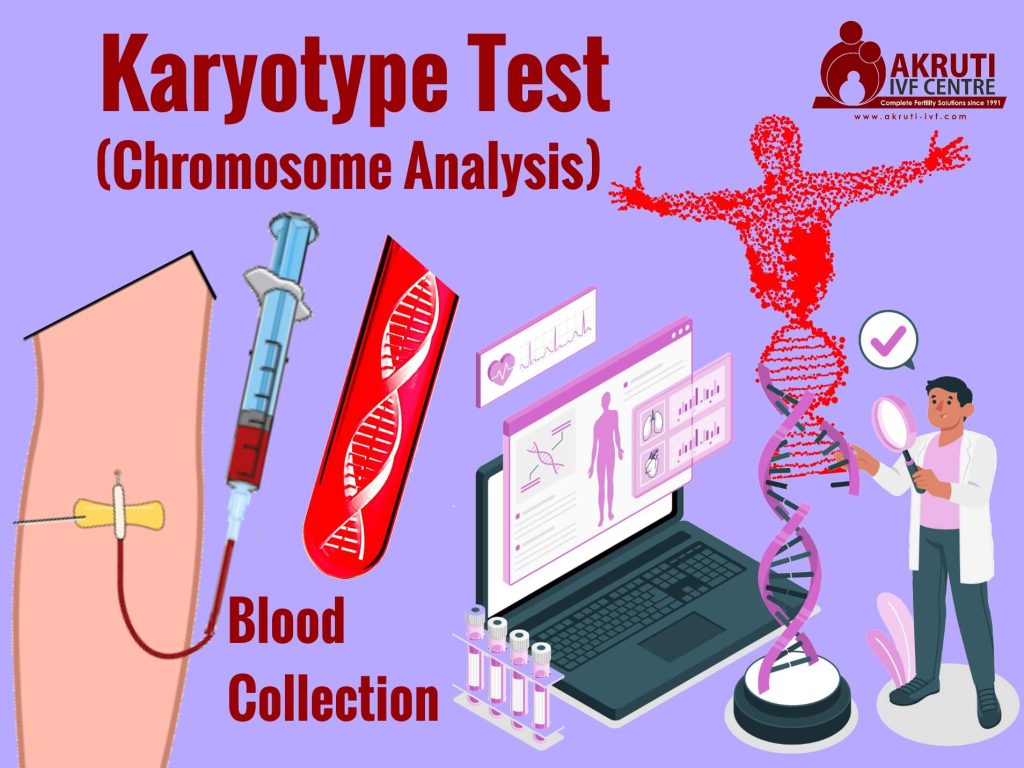Karyotype Test

What is Karyotyping test or Chromosome analysis?
Karyotyping test also known as chromosome testing or cytogenetic analysis is one of the genetic tests to determine any defects in the 46 (23 + 23) chromosomes (23 from father & 23 from mother) passed on from our parents. This test is very important to drastically increase the chance of having a healthy baby free from any genetic disease, disorder or birth defects.
Why is karyotyping test done?
In Akruti IVF centre a Karyotyping test is done to increase the chance of having a healthy baby. Any disorder drastically affects your fertility & chance of having a baby or a baby with birth defects.
A lot of times husband & wife are not fully aware of the family genetic history & there is high possibility that their upcoming baby can have any of the disorder, some common disorders mentioned below;
- Down Syndrome – A Mentally & physically challenged Baby.
- Edward Syndrome – Baby with severe physical defects (short life).
- Patau Syndrome – Baby with heart defects & mental disability.
- Klinefelter syndrome – Baby with slow puberty (low male hormone) cannot have children
- Turner syndrome – Baby with heart defects small height & infertility.
Imagine the difficult life of parents with an abnormal baby (Baby with birth defects), the mental trauma & the pain they have to go through their entire life.
Thus at Akruti IVF we strongly suggest a karyotyping test in order to rule out any genetic conditions so as to increase the probability of having a normal healthy Baby.
When is a karyotype test recommended?
At Akruti IVF we recommend Karyotype test to all patients (both Husband & wife) before undergoing any IVF cycle treatment. Usually the karyotype test is recommended if there is:
- Any family history of any genetic disease or disorder
- A difficulty in getting pregnancy
- A history of miscarriages
- Any stillbirths (Baby expired inside womb)
- If the wife age is 35 years or above
- Any clinical indication based on research & doctor diagnosis
In case the patient is pregnant or comes with a pregnancy & there are clinical indications / findings of congenital anomaly (deformations in unborn baby) or abnormality through Advance ultrasounds scans (sonography) in such cases the unborn baby’s karyotyping is tested by;
- Chorionic villus sampling (CVS) – also known as chorionic villus biopsy, It is a prenatal test done at 10 to 13 weeks of pregnancy. A small sample of the baby’s Placenta cells (Placenta provides nourishment to baby in womb) also known as chorionic villi.
These collected placenta cells are send to Laboratory for testing to know whether the baby has any Genetic problems like Down syndrome, Edward Syndrome, Patau Syndrome or any other genetic problems.
- Amniocentesis test – A sample of Amniotic Fluid (the liquid around baby in the womb) is taken, it is done at 15 to 20 weeks of pregnancy. Thus fluid is sent to laboratory for testing genetic abnormalities
What happens during karyotype test & what samples are used for karyotyping?
A small amount of sample is required based on the reason for the test:
Adults / children’s – In adults and children, karyotype samples are most commonly obtained from blood. A laboratory technician or a nurse draws a sample of your blood from a vein in your arm using a thin needle (just like a routine blood test).
Unborn baby – A fetal Medicine specialist doctor takes a small sample from the fluid that surrounds the baby during pregnancy (amniocentesis) or the chorionic villi (chorionic villus sampling) which are parts of the placenta that have the same chromosomes as the developing fetus (unborn baby)
The collected sample is then sent to the genetic diagnostic laboratory so that it can be analysed by a geneticist. A geneticist is a doctor who specializes studying in chromosomes and genes to determine the number, shape, and size of the chromosomes in your body. The results from a karyotype test may take a few weeks.
What do my karyotype test results mean?
Karyotyping test results may take 1 to 2 weeks, once test results received the patient is called for counseling.
In counseling the patient is explained the results, an abnormal result means a significant risk of transferring the genetic disorder to the potential upcoming baby. Thus the Genetic Expert Doctor in Akruti IVF will explain the results & further course of treatment and right options available to the patients.

